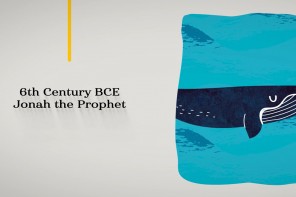Elijah: he is present to children and old men alike. In moments of solitude, he emerges to lend wings to our imagination. In moments of joy, he is there to share in it. Elijah: the impossible but necessary hope, the reality of fantasy. Elijah: a poet’s dream, a philosopher’s challenge. Elijah and his miracles. Elijah and his battles. Elijah and his victories, which are our victories. Elijah, our intercessor. He took God to task and God thanked him for his courage—God, but not the people. The people he defended actually made fun of him. . . .
We know little about Elijah the man, about his father, his place of origin, his teachers, his mentors. Like a character in a play, he reveals himself only by what he does and says on stage. All the rest is mystery. His official identity itself is obscure. Elijahfrom-Tishbi. It is doubtful that there was ever a place with such a name. One Talmudic source claims that he was of the priestly tribe. No convincing proof is offered, which enables other tribes to claim him. He belongs to all the tribes, to all of us. He responds to man’s eternal need for poetry and his eternal quest for justice.
Let us read from Scripture: There were kings in Israel and Judea, and most of them were mediocre and selfish, some were even worse. In a house divided against itself, spirituality was first to go. Leaders emerged and disappeared in endless wars, intrigues, plots, and counterplots. Wars and alliances with Phoenicians and Assyrians, usually for the wrong motives, resulted in increased degradation, idolatry and more idolatry. The God of Israel was a stranger in His own land.
The most wicked of the kings was Ahab, who sinned more than his father Omri—who sinned more than his father Jeroboam ben Nebat. To secure his alliance with the Phoenicians, Ahab married the Phoenician princess Jezebel, daughter of Priest and King Ethbaal of Sidon. Under her influence, he built pagan temples, opened his palace to false prophets, and allowed the reconstruction of Jericho despite Joshua’s memorable order.
Ahab goes from sin to sin, from disgrace to disgrace, taking the entire nation and its history with him. They were falling lower and lower; nothing and no one could stop them, let alone save them.
And then, all of a sudden, the text says: Vayomer Eliyahu ha-tishbi mitoshavei gilead el Ahav . . . “And Elijah, the Tishbi, citizen of Gilead, addressed King Ahab and told him: ‘I swear by the God of Israel that there will be no rain until I so order.’“
Eliyahu the Tishbi, citizen of Gilead. Place of birth, unknown. Age, unknown. The text wants him to remain unknown.
Except for his visible qualities. From the opening sentence we learn that Elijah manifested himself through language, through his courage, and also through his faith in his own strength. He knows his threats are not idle.
Thus we know right away not only that Elijah exists, but that he is a prophet. We are there as he confronts the king in person. He tells the king that he is not the mightiest creature; that there are powers that elude him; that there is a will that his will cannot control. “From now on,“ says Elijah, “I and I alone shall decide when this land will know happiness or hunger; I and I alone shall be the master of the rain that links the skies above to the earth below.”
Surely a man of courage, Elijah. He hardly has finished his sentence, however, than he has vanished. If Ahab answered him or reacted to his threat, it has not been recorded. All we are told is that Elijah spoke and . . . fled. Before we accuse him of cowardice, however, we ought to know that he fled on orders, God’s orders. God simply ordered him to go away and hide near the Jordan River. To see no one and be seen by no one. “Do not worry,” God told him, “You will be fed by ravens. And the river will give you its waters. You will live in hiding but you will live. And lack nothing.”
Not so the others. When Elijah’s prophecy came true, the three-year drought brought hunger to the land and the people. The earth was thirsty, and so was the prophet. He left his hiding place and found refuge with a widow whom God had ordered to feed him; she was rewarded: she never ran out of food. But her son fell ill, and Elijah was blamed: “It’s your fault,” she said. “You came and brought my sins to the foreground and thus harmed my son, who is now dying.” In Scripture, this angry outburst is incomprehensible.
In the Midrash, it is not. Listen to its interpretation. “Before you came,” said the widow, “God loved me because I was virtuous—I mean, compared to others I was, I really was. But compared to you? . . . So it is because of you that God doesn’t love me anymore. Why did you come here? Why?” Well, Elijah has no choice; he had to cure her son.
A miracle? Yes. Like Moses, whom he resembles in twenty-eight ways, Elijah performs miracles. But this one is of a particular kind; it takes place in quasi-secrecy. Whereas most miracles are meant to impress as many witnesses as possible, this one was witnessed by only three persons, Elijah included. He did the same again later, centuries later, when he comforted, consoled, and saved despair-stricken victims in exile by appearing to them alone.
In Scripture Elijah performed other more public, more spectacular miracles as well. He challenged King Ahab to a public confrontation, a gigantic verbal duel. His language was clear, provocative: “You worship the idols, I serve God—let us see who is alive and who is not.” The entire population was invited to Mount Carmel, especially the false prophets: 400 Baal worshippers and 450 of Jezebel’s house-prophets, so to speak. Facing this assembly was one man, Elijah, who believed in one God, the God of Israel.
And Elijah spoke, and what he said made sense: “You cannot serve both God and Baal; you cannot be both Jewish and anti-Jewish; you cannot believe in your own destiny and in someone else’s. You must commit yourself, take a stand. Ad matai tifsekhu al shtei haseipim! How long are you going to live in two camps at once?” One must choose. If God is God, follow Him; if Baal is God, follow him.
The people, says the text, did not reply: already then, people preferred to wait, and join the winner. Elijah himself directed the staging, and his directions are so explicit and so detailed that they offer a rare glimpse into ancient pagan Baal rituals.
Two oxen were brought, and Elijah asked his opponents to choose one and offer it in sacrifice, according to their tradition. Then he would do the same, except that both rites included an offering by fire, which comes from God alone. “Well,” said Elijah, “let us see your god and mine at work.” The other side accepted the challenge, and lived to regret it. Courteous, Elijah allowed the prophets of Baal to open the contest. They built the altar and prayed for fire. But there was no fire. The priests and prophets implored Baal with all their might; there was still no fire. In fact, says the Midrash, there was nothing. Only silence—like the silence that reigned when God gave the law: the birds did not sing, the oxen did not bellow, the angels did not fly, the sea was calm, no creature made a sound. God caused creation to be silent, and void, and empty, as if no living thing existed. For if anyone had spoken, the priests would have said: “Baal has answered us!”
But Baal remained mute, absent. At this point, Elijah began to mock them: “Perhaps you are not shouting loudly enough! He is asleep or away! Wake him up. . .”
The prophet’s irony may seem unfair and therefore out of character. Is it proper to ridicule a defeated adversary? But as we scrutinize the text more closely, we realize our mistake: the false prophets are not yet defeated—since Elijah has not yet performed his miracle. Since he was not sure that his plea would be heard and that he would obtain fire from heaven, he simply was pushing them to continue their efforts with increased vigor, not to give in too soon. And they did not. They howled and shouted, and lacerated their flesh in collective madness for hours and hours. Finally, at dusk, they admitted defeat.
Then came Elijah’s turn. He “rebuilt” the altar with twelve stones to illustrate the unity of Israel’s twelve tribes. And he implored God’s help: “God of Abraham, Isaac, and Jacob, prove to us here that You are the God of Israel . . . Aneni adoshem, anoneni—answer me, God.” The Midrash interprets this poetically: “Answer me so that people will understand Your part in the miracle. And the entire people saw God’s answer; the entire people saw a fire that came down from heaven to accept and consume Elijah’s offering.” The story does not end here. After Elijah’s victory, he ordered the people to massacre all the false prophets.
The Midrash is not too concerned with the tragic fate of the false prophets, surely not as much as with the fate of the poor oxen. Listen to its description of the event: In order to be absolutely fair, Elijah suggested to the prophets of Baal to choose two twin oxen and then to let fate decide which of them would be sacrificed to God and which one to Baal. The first gave no resistance and followed Elijah as would a friend. As for the second one, he simply refused to play his part. Not only didn’t he agree to follow the false prophets but he remained riveted to the ground—and no power in the world could move him. All the priests and prophets, and their assistants, tried and failed.
The scene would have been comical enough without the ox who felt the need to explain his behavior to Elijah: “Look,” he said, “here we are, twin brothers, born of the same mother; we grew up together, we were fed together, we walked together in the same fields and rested in the same shade—so tell me: why am I to be discriminated against? Why is my brother being offered to the eternal God and I to a silly idol? Why should my brother sanctify the living God while I anger him? Is this fair or just, tell me?” Elijah understood: the ox was right—but still, the show had to go on! So he tried to comfort the poor ox: “Do not worry,” he told him, “you too will sanctify God’s name—you by being offered to Baal and your brother by being offered to God; you both have lived and will die in His service and for His sake,” Still the ox was not convinced: “I understand you,” he replied, “but I am not going to Baal voluntarily! Since I must go—you make me go! You deliver me into their hands!” And Elijah had no choice but to comply.
Naturally God won and the people exclaimed: Adoshem hu ha Elokim, “God is God.” And clouds covered the sky and it began to rain. Once more earth gave man his sustenance. All was well—creation had reconciled itself with its Creator.
As for Elijah, things were not any easier for him afterwards. True, he had won, but he was not out of danger. Once again he had to flee. What a strange destiny; when he lost, he fled, and when he won, he fled. There was a price on his head and he went underground. But who was hunting him down? King Ahab had repented at Mount Carmel. Elijah paid him due homage as king, and, as was the custom, ran in front of his chariot. It was Jezebel who would persecute Elijah, God’s true messenger.
She was his real and most vicious enemy—she more than her husband. Now she was determined to avenge the massacre of her loyal priests, an event she had not been aware of until it was too late. Had she been there, Elijah’s task surely would have been more difficult.
The confrontation on Mount Carmel had been planned and executed behind Jezebel’s back. Elijah wanted her to be absent during the momentous confrontation, not because he was afraid of her, but because her husband was. In that royal family, clearly it was the woman who reigned. Jezebel ruled over her husband and therefore over the nation. It was she who made the most important—and bloodiest—decisions; it was she who ordered the slaughter of the true prophets of the Jewish people, she who built altars to Baal, she who manipulated people against people, and all against the God of Israel. If that Jewish kingdom became indifferent to its own mission, it was her doing. Ahab was too much in love to protest—and she made him more and more dependent on her. . . .
One can visualize Jezebel’s rage all the better since it is reported in Scripture. She informed Elijah by messenger: tomorrow you will be dead—tomorrow.
Well, Elijah was too clever, too intelligent not to take her threats seriously; he knew the danger of a woman’s fury. He fled into the desert and stayed there forty days and forty nights, and then he had his moving, heartbreaking, and terrifying encounter with God. That encounter remains a high point in the life of the Jewish people—and his own.
Strange: this encounter is marked by despair and not by exuberance. Instead of rejoicing at having defeated Baal and escaping death, Elijah seems dejected, depressed. He wishes to disappear altogether, to die. When God asks him why, he answers, “I have fought for You, I have fought Your children on Your behalf; I have punished those who sinned against You—and now, here I am in a cave, alone, and in danger; I am the last.”
Actually, God could have argued with him: “Sad—now? After your triumph?” But arguments never could cure depression. Instead, God chose to tell him a story, which is still a fairly good remedy against melancholy. And God said: “Tze, go, leave the cave and stand upon the mountain before Me.” And behold, God passed by, and a great and powerful wind rent the mountains, and broke the rocks into pieces before God; but God was not in the wind. And the wind was followed by an earthquake; but God was not in the earthquake; and the earthquake was followed by a fire; but God was not in the fire; and the fire was followed by a small voice, wrapped in silence. Does that mean that God is in silence? The text does not say so explicitly, but Elijah understood: he wrapped his face in his mantle, went out and stood at the entrance to the cave. And, behold, there came a voice unto him and said: “What are you doing here, Elijah?” And, for the second time, Elijah had to explain: “I fought for You, I alone fought for You—for Your children have forsaken Your covenant, destroyed Your altars, and slain Your prophets with the sword; and now I am left alone, I am in danger too; I am the last.” God’s answer is surprising, to say the least. Instead of comforting him, of attenuating his pain and anguish, lifting his spirits, He informs Elijah that his term of office has come to an end. Elisha, son of Shaphat, will be his successor.
Elijah agrees, Elijah always agreed with God. Elijah may even have been pleased. Had not his most fervent wish been to live and die for God—at the hands of God, and not at the hands of the people?
But why did God speak without compassion? How could He remain unmoved by Elijah’s outcry that he was alone and the last—the last to recognize the truth, the last to remember, and the last to keep so many memories alive?
God spoke without compassion because Elijah had spoken without compassion. Even now he was too harsh with his people. He was angry with the kings for having betrayed their sacred mission by worshipping alien idols. He was angry at the people for having built the wrong altars and for having worshipped false gods. All that is understandable. But the people were not all guilty, as the Midrash emphasizes. Obadiah dared to hide a hundred young prophets, whom Jezebel sought to slaughter. Furthermore, all the neighbors, and the neighbor’s neighbors, thus the entire population, knew about them. Yet nobody denounced them to Jezebel. And when Elijah told Jezebel and her husband that he, and he alone, was now serving as God’s prophet, everyone knew that this was not so, and nobody spoke. The Talmud comments: although Ahab’s generation was idolatrous, it was equal to David’s—for it had no informers.
Elijah’s anger seems, therefore, rather excessive. Hence God’s response. No one may condemn an entire community. No one, not even its most prestigious prophet, may turn against his own community. He obeyed God’s will, but now he must pay the price. One is not chosen by God without, at the same time, or at one time, becoming His victim.
For having defined himself as being alone—alone against his entire people—Elijah will be admonished by God. This is described in the Midrash more than once. The drought lasted three years because Elijah had predicted it as punishment for the wicked kings and their followers. But what about the children, the innocent? God Himself had to urge Elijah to release Him from His pledge and stop the famine. At the end, outside the cave, God felt it necessary to plead for His people—against Elijah. Said God: “Why are you so harsh with My people? Are the others better, worthier? Have you seen the pagans at Damascus and elsewhere? Compared to them, My children are good and saintly.” There is irony: God was angry at Elijah for having obeyed Him too well. And so it was time for him to leave and ascend to heaven. Only to return after having been cast into a totally different role. The post-biblical or post-ascension Elijah has undergone an astonishing metamorphosis. Talmudic legend now represents him as the friend and companion to all those who lack friendship, comfort, and hope. To the cynic, he brings certainty; to the wanderer; a spark of light and warmth. To the sage, a teacher; to the dreamer, a dream: that is Elijah. His visits—or his revelations—are rewards in themselves. One must deserve them. That is true of his miracles too: they must be deserved. But then, Elijah is reliable, he keeps his promises, fulfills his pledges. And when he is unable to help, at least he suffers with us and weeps over us.
The chastising preacher has become the prophet of consolation. As angel and protector of Israel, he dominates time and space: he is everywhere at the same time. He cannot be described, since his disguises are numerous. Sometimes he appears as an Arab, or a Persian, a Roman, a horseman, a soldier, and even as a woman of questionable trade. On one occasion he had to save Rabbi Meir. Roman soldiers chased him and were about to close in on him when they saw him being picked up by a streetwalker! No, impossible. They turned around and gave up the chase. Clearly, they were second-rate detectives. Why didn’t they realize that the woman had to be the prophet Elijah walking with Rabbi Meir in order to save him? . . .
But sages and saints are not the only ones to be visited by Elijah. They alone are privileged to see him, but he sees everybody. He loves poor people, pious people, simple people. God looked about among all the qualities to bestow upon Israel and found none better than . . . poverty,” he once declared. He visits all Jewish homes at least once a year during the Passover Seder service—and attends all circumcision ceremonies. Any Jew entering Jewish society must be welcomed by him; he is present in our joy, as we are present to him. But he attains his apogee in mystical and Hasidic literature, where he is both master and messenger, source and vessel, form and substance. Gilui Eliyahu is more than a concept; it is an adventure close to the Messianic one. Lurianic scholars evoke him in ecstasy. The Besht’s companions dedicate their dreams to him. Of all the prophets, it is Elijah who sets the imagination on fire. Why? Because Malachi links him irrevocably to the Messiah? Because of the expression Veheshiv lev avot al banim—“he will reconcile children and their parents”? Because he sent a letter to Yehoram ben Yehoshafat seven years after his death? Why has he, of all the prophets, become the symbol of consolation? Why Elijah and not Jeremiah, nor Isaiah? Why has his legend left such an imprint on our mystical quest throughout the generations from and into exile, from and to Jerusalem? Elijah: the great hero, the romantic rescuer, the personification of chivalry, faith, and courage, especially in Midrashic and Hasidic tales.
In that literature we are struck by a strange factor: whenever a stranger appears, he takes on the identity of Elijah. At first Elijah is unknown, then the unknown becomes Elijah. A stranger utters a true word, performs a true deed: it must be Elijah. A man with no name or trade emerges from nowhere to accomplish a secret mission, it must be Elijah. The best proof is that he disappears as soon as his work is completed. And his disappearance is as mysterious as his appearance. He responds to our inner need: he is the tenth man for the Minyan, the secret emissary who advises the prince to revoke his evil decree, the compassionate Gentile who stops the hangman at the last minute, the mysterious traveler who arrives at the right moment, at the right place, to prove to a despairing person or a despairing community that hope is forever possible and it has an ever-changing face.
But one day he will come and stay. On that day he will accompany the Messiah, with whose destiny he is linked. One cannot fulfill his mission without the other. For the Messiah to come, he must be preceded— and announced— by Elijah.
In the meantime, he consoles and occasionally cures the sick. He encourages the helpless. He takes risks and defies enemies to safeguard Jewish survival. We have no better defender in heaven than Elijah. He is linked to Jewish suffering and speaks about it to God. In fact, he is the chronicler, the historian of Jewish suffering. He takes note of every tragic event, every massacre, every pogrom, every agony, and every tear; thanks to him, nothing is lost. His most magnificent role is that of witness; he is the memory of the Jewish people. Legend has it that at the end of time, his book will become the new Torah, which the Messiah will study and teach so that forever afterwards mankind will remember Jewish suffering, Jewish waiting, Jewish longing.
Excerpted from Five Biblical Portraits [London: University of Notre Dame Press, 1981], pp. 38–64
Reprinted with permission of Georges Borchardt, Inc., for Elie Wiesel.





